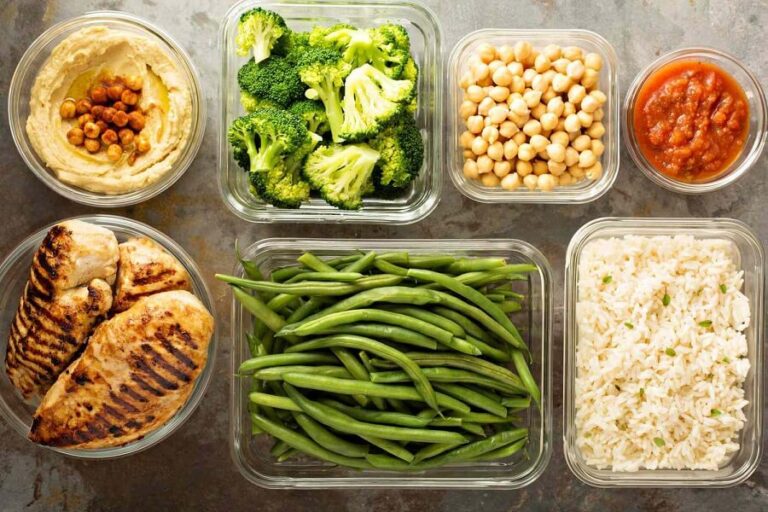The ability to eat less food is one of the most important qualities for maintaining a stable and healthy body weight. For this you not only need to reconsider your eating habits, but also use psychology.
To learn how to eat less and lose weight, you will have to cut out sugary foods. Why? Research suggests that foods with a high glycemic index can increase appetite, in addition to triggering depression. (1)
The habit of using sweets to improve mood is common among many. However, the long-term effect of using too much of these foods is that you inevitably overeat.
RELATED:
Why is it so difficult to eat less?
Eating less is difficult because most of our body’s processes are regulated towards homeostasis. What does this mean? That our body will always tend to maintain the stage that is “normal” for it.
When you eat a lot, especially certain food groups, such as sugary ones, or do restrictive diets, homeostasis is altered and the hormones that regulate hunger are altered as well.
First, ghrelin : it is what generates the need to search for food. Second, leptin, which is the body’s signal to tell the brain when to stop eating.
Third, the production of the hormone insulin also affects appetite and allows the body to absorb calories from food eaten.
So, if you are looking to eat less and regulate hunger, you should go little by little, giving your body enough time to adapt to the new habits. It is also advisable to work not only on the plane of eating less food, but also on increasing the quality.
9 ways and tricks to eat less
To eat less and fill up faster, the most important thing is to train habits associated with eating healthy foods; This will help control the calories from the food that goes into your mouth. Also, indulging yourself sporadically will help you to have a good relationship with food and understand what your body really needs.
Here are 10 ways and tricks to eat less:
1. Reduce glutamate
Although a natural flavor enhancer, monosodium glutamate, is found in lower amounts in tomatoes and mushrooms, fast food often contains its synthetic counterparts, tens and hundreds of times more. Glutamate stimulates the appetite and leads to the consumption of excess calories.
2. Control portions
In simple terms, losing weight requires not only learning to eat less, but also understanding your fair share. The plates should be full and you should not feel a strong hunger when you finish eating.
Use small plates to serve your food, otherwise it will be much more difficult to estimate the portion size needed and you will eat more than necessary. Increase the consumption of vegetables, and do not reduce more than 20% of the calories you need .
3. Don’t skip meals
Don’t skip meals and eat every 3-4 hours; otherwise, you won’t be able to stop eating the moment you get to your meal. If you don’t have a chance to eat completely, avoid sweets – a piece of cheese or dried fruit will satisfy your hunger much better than a handful of raisins.
4. Don’t mindfully eat in other activities
If you eat using your cell phone, playing games or watching TV, it is very likely that you will not even notice how you eat an additional 500 calories, it will simply automatically open the package and send a snack to your mouth. To eat less, practice mindful eating and give yourself space when eating.
5. Never eat with your hands
When eating food with your hands (be it popcorn, chips, nuts, or candy), it is almost impossible to estimate the amount of food eaten. Try to place the food on a plate to visually represent whether it is a large portion or not.
6. Eat more protein
The protein foods (meat, fish, eggs, milk, legumes) provide a more lasting satiety than carbohydrate foods (bread, potatoes and pasta). Make sure every meal contains at least one protein source.
7. No abuse del gluten
The gluten is a protein found in wheat. Its key feature is that it can retain carbon dioxide, this is what helps give it that fluffy structure from the baking process. However, gluten can cause a “full belly” habit, eventually leading to overeating.
8. Alcohol in moderation
Not only does excess alcohol stimulate your appetite, it also reduces your sense of control over what you eat; Most of us have experienced that feeling that you no longer care if you eat a lot or a little. However, it is known that drinking alcohol in moderation can have its benefits. Having a glass of wine may help you with your overall mood and lower your insulin levels, which is one way to help you eat less.
9. Brush your teeth after eating
Although fullness from food comes only after 10 to 20 minutes, many people eat in less time. The sensation of having food in your mouth can make you want to eat more. Brushing your teeth is an easy way to stop this process.
RELATED:
- How do carbohydrates affect the brain?
- How many calories to eat for breakfast, lunch and dinner?
- How to reduce appetite?
How many times a day should you eat?
Even though weight loss is achieved with only a calorie deficit, research suggests that eating more frequent meals can help control hunger more easily. The rule that you should eat 4-5 times a day is one of the basic recommendations for losing weight.
The reason eating small meals can help you lose weight is because this approach allows you to monitor your diet more closely, that is, control calories and consumption of low and medium glycemic index carbohydrates.
The maximum size of the portion allowed in a diet for weight loss is not more than 500-600 kcal. Taking into account the fact that you need to eat 4-5 times a day, This will allow you to keep your daily calorie intake in the range of 2000-2500 kcal, the norm for most adult women and men.
ABSTRACT
In order to eat less and fill up faster, first of all, you need to monitor the glycemic index of the carbohydrates consumed: they affect not only the processes of weight gain, but also the feeling of satiety and even the mood. Also, it is important to eat mindfully, not while watching videos or talking.







